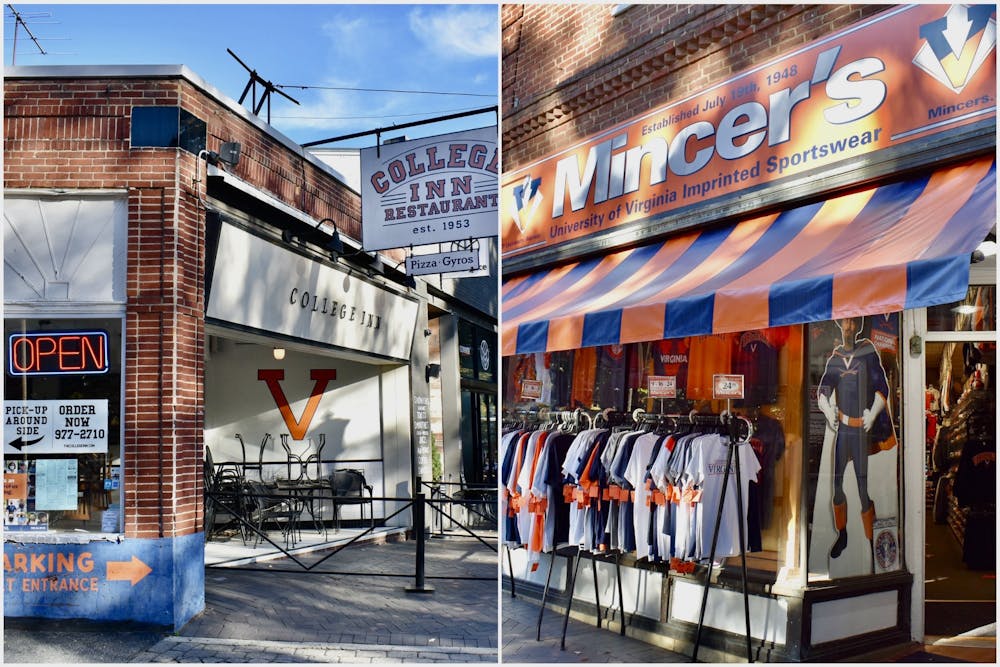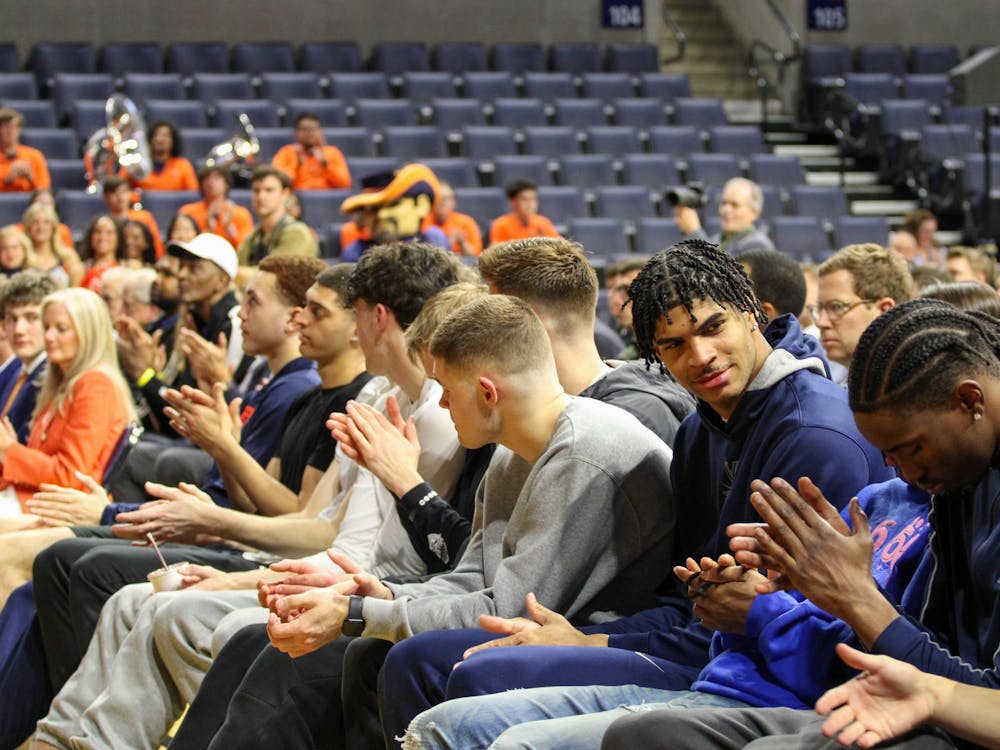Lea en español
While college football is beloved by millions of fans, the sport isn’t just a source of entertainment. For many stakeholders, college football is essential for their livelihoods. Beyond college football’s financial importance to most athletics departments, the lucrative sport is also a major economic driver for college towns across the country. Charlottesville is no exception.
In August, Sports Illustrated estimated the economic impact of Big Ten college football games in cities like Madison, Wis., Lincoln, Neb. and Iowa City, Iowa to range from $12 million to $16 million per home game. While Scott Stadium is smaller and Virginia has a less prominent football program than the venues and schools in these cities, college football still leaves a substantial impression on Charlottesville.
Tens of thousands of fans usually flock to Charlottesville each football gameday. In 2019, an average of almost 48,000 people attended Virginia’s seven home football games. But these fans don’t just watch the game while they’re in town — they also go shopping, dine at restaurants and stay at hotels, providing a substantial boost to the local economy.
Amid the ongoing COVID-19 pandemic, Virginia Athletics has restricted attendance at home games to families of student-athletes and coaches, citing health and safety considerations as well as guidelines provided by the Commonwealth of Virginia. Currently, these guidelines restrict attendance for sporting events to less than 50 percent occupancy of the venue or 1,000 patrons.
According to Roger Johnson, economic development director for Albemarle County, the loss of football fans — meaning numerous potential customers — compounds the pandemic-induced economic recession that has been hurting the local economy for months.
While Johnson mentioned that unemployment in the region has been gradually improving from its lowest point around 12 percent to around 8 percent now, he admitted that the local economy is still a ways away from pre-pandemic levels when unemployment in the Charlottesville-metropolitan area was at 2.4 percent.
“You get the idea that the economy is definitely trending in a favorable trend since the pandemic has hit, but it's nowhere near recovered,” Johnson said. “Just based on [unemployment] numbers alone, you can tell the economy is still struggling.”
Johnson elaborated that the absence of fans from home football games affects various industries in the area including travel, restaurants and lodging. He added that businesses closer in proximity to the football stadium are likely to see the greatest impact.
For example, the success of Mincer’s — a fourth-generation family-owned store that sells University-themed apparel — is understandably linked to the presence of Virginia football. On days of home football games, Mincer’s location on the Corner is usually filled with shoppers, but the combination of the pandemic and an empty Scott Stadium has made this impossible.
“That Saturday [of a football weekend], for like three or four hours before and then a few hours after [the game], it's just packed in here, the whole time,” said Cal Mincer, vice president of Mincer’s University of Virginia Imprinted Sportswear. “You can barely move around there's so many people in here. But this year, when you can't go to the stadium and we can only let 10 people in here at a time, it's not like that.”
Mincer estimated that the store saw “less than a quarter of the usual foot traffic” on the day of Virginia’s season-opener against Duke.
“We're hoping for the best, but we were not surprised to see it [being] fewer people than a typical gameday,” Mincer said. “As the season goes on, it seems like it'll probably be the same … On our end, we're just trying to keep the doors open and the shelves stocked.”
Beyond Mincer’s, the hospitality industry, including restaurants and hotels, is also set to be hit hard by both the lack of fan attendance at football games and the pandemic more broadly. Roy Van Doorn — president of the Charlottesville chapter of the Virginia Restaurant, Lodging & Travel Association — estimates that the local hospitality business is potentially down 20 or 25 percent in a season without fans as compared to a normal season.
The pandemic’s impact on Charlottesville restaurants has been clear, and many historic establishments are fighting to stay afloat. Stuart Rifkin, a business partner at the College Inn, said that the restriction on fan attendance is especially challenging for restaurants on the Corner, which is generally a high-traffic area on gamedays.
“The lack of football [fans hurt] because those are big weekends for Boylan, big weekends for Trinity, big weekends for everybody on the Corner,” Rifkin said.
Rifkin, a 32-year veteran of the restaurant business, described home football games as “six or seven Foxfields a year” and likened them to the Fridays After Five live concert series — all events that bring big business to the Charlottesville area.
On the operational side, restaurants have been forced to adapt due to the pandemic. Many — including the College Inn, Bodo’s Bagels and Lampo Neapolitan Pizzeria — have gone outside their comfort zone, closing or modifying their dining rooms and focusing more on the competitive delivery and carry-out businesses. Additionally, Van Doorn elaborated that restaurants are selling less of their most profitable items — like alcohol, appetizers and desserts — while incurring more costs related to delivery and carry-out.
With some restaurants changing their entire business model and paying as much as hundreds of thousands of dollars annually just in fixed costs like rent and loan payments, it’s evident that local restaurants will continue to face financial challenges.
“A lot of it boils down to your debt service and your landlord,” Rifkin said. “It's like that in every business. If you have enough funds to weather the storm, and you have enough gas in your engine to make it over the 20-foot swells, you'll come out okay on the other side.”
Rifkin added that given how some local restaurants have fared during the pandemic, if the College Inn is generating half of its usual sales, they’re doing well.
“I hope that, with caution, we can reopen our economy and hopefully save some of our restaurants because restaurants are one of our big attractions in town,” Van Doorn said. “Without restaurants, Charlottesville loses one of its important draws as kind of the culinary capital of Virginia.”
Similar to restaurants, hotels have also been negatively affected by the pandemic. With less people traveling for business and leisure, hotels across the country have struggled to maintain profitability.
“Consumer travel is at an all-time low due to the pandemic, and the U.S. hotel industry has been hard hit,” Asst. Commerce Prof. Christi Lockwood said. “According to the American Hotel and Lodging Association, almost two-thirds of hotels are operating at or below 50 percent occupancy — that is, below the threshold at which most hotels can break even and pay debt.”
A key metric in hotel performance is revenue per available room, which is calculated by multiplying a hotel’s average rate for a room by its occupancy rate. Locally, RevPAR — which the Charlottesville Albemarle Convention & Visitors Bureau measures — has declined due to the lack of fans at athletic events, Johnson explained.
At the moment, Van Doorn estimates that the Charlottesville lodging industry is doing about half the business it usually does, even when taking into account the six local hotels that have been designated as housing for individuals who either tested positive for COVID-19 or were required to quarantine because of exposure to it. The trend is mainly driven by the loss of large traditional segments like travel, weddings and — of course — fans at major sporting events.
“Those [segments] won't return for the most part until COVID is perceived to be either under control or we're in serious recovery,” Van Doorn said. “I don't think that we're going to see any real change until, at the earliest, next March.”
While Van Doorn admits that the impact of sports on the local hospitality sector has diminished due to growth in the winery, brewery and wedding industries, he recognizes the benefits of allowing fans to attend home games and what it would mean to Charlottesville.
“This year, a lot of [events aren’t happening] so if we had a stadium that we could fill up, it would have a big impact,” Van Doorn said. “If we could have a full stadium now, boy I'll tell you what, it would be a huge shot in the arm for the community.”
Given the current state of the economy, Van Doorn and representatives of the hospitality industry have lobbied Gov. Ralph Northam to increase the acceptable occupancy rate at sports venues like Scott Stadium and Lane Stadium in Blacksburg, Va., both of which can hold upwards of 60,000 people.
“We are lobbying for a percentage that is doable within safety [standards],” Van Doorn said. “If you’ve watched any football games from Florida or Georgia, you'll see how they have filled the stadiums, but they're still spread out. That makes a lot of sense and they've done that for the season, and there's not been any huge spike in numbers.”
As the pandemic continues, the Charlottesville hospitality industry braces for winter. According to Brantley Ussery, director of marketing & public relations at the CACVB, as the weather gets colder in November, the city loses attractions, like autumn foliage, that help it remain an appealing destination in the fall. Ussery explained that, in pre-pandemic times, football weekends could drive traffic to the city even in colder months, but that clearly won’t be the case this year unless regulations change. Van Doorn echoed Ussery, stating that the combination of the approaching winter season, ongoing pandemic and loss of football fans has the entire industry concerned.
That being said, regardless of what obstacles they face, the people of Charlottesville seem determined to not go down without a fight. Businesses in town have survived for decades for a reason. But, for many — as resilient as they may be — the pandemic might just be too difficult to overcome.
“I think we're all pretty hardy people,” Van Doorn said. “The [hospitality] business is not for the meek, it's a hard business. We're used to challenges. [People are] doing whatever they can to survive until next spring, hoping that, by then, most of this is going to be done. This winter will be hard. There's just a lot of people that are not going to make it, and [that’s] through no fault of their own.”







